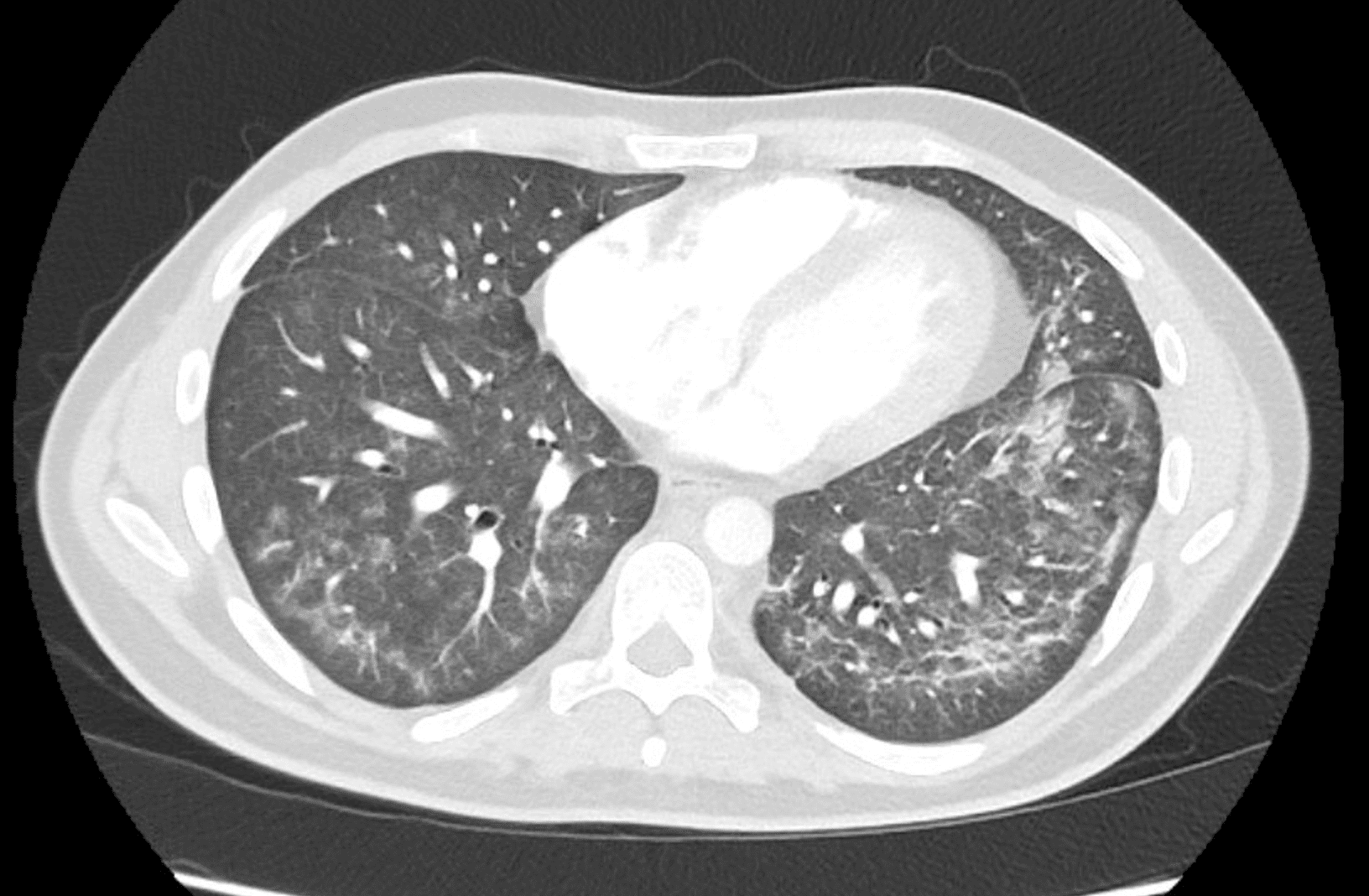Sunday Poster Session
Category: IBD
P1261 - A Rare Case of Infliximab-Induced Interstitial Pneumonitis in an Ulcerative Colitis Patient
Sunday, October 26, 2025
3:30 PM - 7:00 PM PDT
Location: Exhibit Hall

Hamza Almusabeh, MBBS (he/him/his)
West Virginia University School of Medicine
Morgantown, WV
Presenting Author(s)
Hamza Almusabeh, MBBS, Zach Kovach, MD, Khaled Elfert, MD, Jennifer Hadam-Veverka, MD, Kanwarpreet Tandon, MBBS
West Virginia University School of Medicine, Morgantown, WV
Introduction: Ulcerative colitis (UC) is a subtype of inflammatory bowel disease (IBD) characterized by abdominal pain, hematochezia, tenesmus, weight loss, and malaise. TNFα inhibitors, such as Infliximab, are frequently utilized in treating UC. Upper respiratory tract infection is the most common adverse effect seen in patients on TNFα therapy; however, some patients develop serious complications requiring discontinuation of the drug. In this case, we describe a patient who developed interstitial pneumonitis 3-4 months after initiating Infliximab therapy for UC.
Case Description/
Methods: A 27-year-old male with a history of pulmonary emboli and ulcerative colitis, actively treated with Infliximab, presented to the ED with a two-month history of progressively worsening cough and dyspnea on exertion. Chest x-ray was concerning for multifocal pneumonia, and he was treated with two separate courses of empiric antibiotics. Computed tomography (CT) chest with IV contrast revealed diffuse bilateral ground glass opacities suspicious for persistent multifocal pneumonia, along with mediastinal and hilar lymphadenopathy. Microbial samples obtained after bronchoalveolar lavage were negative; however, cytology revealed eosinophilia (20%), neutrophil count (40%), and alveolar macrophages (23%). This was followed by a lung biopsy, which was concerned with organizing pneumonia. Due to concerns for infliximab-induced pneumonitis, Infliximab was stopped, and the patient was started on high-dose Prednisone with complete resolution in reported cough and oxygen requirement. Repeated CT imaging showed the resolution of interstitial pneumonitis. Together, these findings support the diagnosis of infliximab-induced pneumonitis.
Discussion: Post-marketing analysis reports interstitial pneumonitis as a possible adverse effect of Infliximab therapy, although the incidence of this complication remains unknown. We identified at least four other case reports of individuals who developed infliximab-induced interstitial lung disease. In each case, the patient recovered quickly following discontinuation of the drug combined with a corticosteroid taper. Generally, we'd expect immunosuppressed patients to be at a higher risk of pulmonary infection and require antibiotics for treatment. In this case, broadening our differential to infliximab-induced pneumonitis resulted in successful treatment for this patient.

Figure: CT chest showing ground glass opacities throughout bilateral lung fields.

Figure: CT chest showing significant improvement after steroid use
Disclosures:
Hamza Almusabeh indicated no relevant financial relationships.
Zach Kovach indicated no relevant financial relationships.
Khaled Elfert indicated no relevant financial relationships.
Jennifer Hadam-Veverka: Abbvie – Speakers Bureau. Johnson & Johnson – Speakers Bureau. Takeda – Speakers Bureau.
Kanwarpreet Tandon indicated no relevant financial relationships.
Hamza Almusabeh, MBBS, Zach Kovach, MD, Khaled Elfert, MD, Jennifer Hadam-Veverka, MD, Kanwarpreet Tandon, MBBS. P1261 - A Rare Case of Infliximab-Induced Interstitial Pneumonitis in an Ulcerative Colitis Patient, ACG 2025 Annual Scientific Meeting Abstracts. Phoenix, AZ: American College of Gastroenterology.
West Virginia University School of Medicine, Morgantown, WV
Introduction: Ulcerative colitis (UC) is a subtype of inflammatory bowel disease (IBD) characterized by abdominal pain, hematochezia, tenesmus, weight loss, and malaise. TNFα inhibitors, such as Infliximab, are frequently utilized in treating UC. Upper respiratory tract infection is the most common adverse effect seen in patients on TNFα therapy; however, some patients develop serious complications requiring discontinuation of the drug. In this case, we describe a patient who developed interstitial pneumonitis 3-4 months after initiating Infliximab therapy for UC.
Case Description/
Methods: A 27-year-old male with a history of pulmonary emboli and ulcerative colitis, actively treated with Infliximab, presented to the ED with a two-month history of progressively worsening cough and dyspnea on exertion. Chest x-ray was concerning for multifocal pneumonia, and he was treated with two separate courses of empiric antibiotics. Computed tomography (CT) chest with IV contrast revealed diffuse bilateral ground glass opacities suspicious for persistent multifocal pneumonia, along with mediastinal and hilar lymphadenopathy. Microbial samples obtained after bronchoalveolar lavage were negative; however, cytology revealed eosinophilia (20%), neutrophil count (40%), and alveolar macrophages (23%). This was followed by a lung biopsy, which was concerned with organizing pneumonia. Due to concerns for infliximab-induced pneumonitis, Infliximab was stopped, and the patient was started on high-dose Prednisone with complete resolution in reported cough and oxygen requirement. Repeated CT imaging showed the resolution of interstitial pneumonitis. Together, these findings support the diagnosis of infliximab-induced pneumonitis.
Discussion: Post-marketing analysis reports interstitial pneumonitis as a possible adverse effect of Infliximab therapy, although the incidence of this complication remains unknown. We identified at least four other case reports of individuals who developed infliximab-induced interstitial lung disease. In each case, the patient recovered quickly following discontinuation of the drug combined with a corticosteroid taper. Generally, we'd expect immunosuppressed patients to be at a higher risk of pulmonary infection and require antibiotics for treatment. In this case, broadening our differential to infliximab-induced pneumonitis resulted in successful treatment for this patient.

Figure: CT chest showing ground glass opacities throughout bilateral lung fields.

Figure: CT chest showing significant improvement after steroid use
Disclosures:
Hamza Almusabeh indicated no relevant financial relationships.
Zach Kovach indicated no relevant financial relationships.
Khaled Elfert indicated no relevant financial relationships.
Jennifer Hadam-Veverka: Abbvie – Speakers Bureau. Johnson & Johnson – Speakers Bureau. Takeda – Speakers Bureau.
Kanwarpreet Tandon indicated no relevant financial relationships.
Hamza Almusabeh, MBBS, Zach Kovach, MD, Khaled Elfert, MD, Jennifer Hadam-Veverka, MD, Kanwarpreet Tandon, MBBS. P1261 - A Rare Case of Infliximab-Induced Interstitial Pneumonitis in an Ulcerative Colitis Patient, ACG 2025 Annual Scientific Meeting Abstracts. Phoenix, AZ: American College of Gastroenterology.
